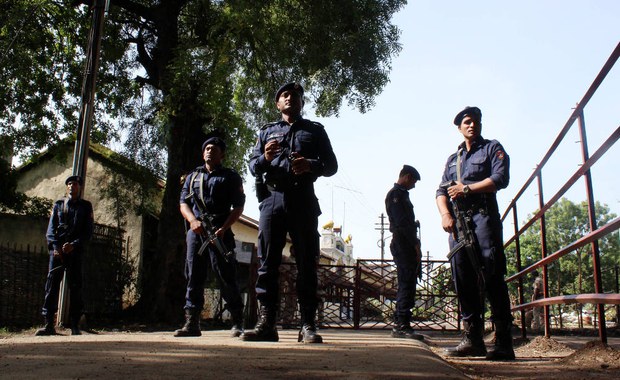Pre-Dawn Plea Dismissed; Execution of Mumbai Bomber To Go Ahead
2015.07.29
 Indian police stand alert at the entrance to Central Jail in Nagpur, where 1993 Mumbai blast convict Yakub Memon is being held, July 29, 2015.
Indian police stand alert at the entrance to Central Jail in Nagpur, where 1993 Mumbai blast convict Yakub Memon is being held, July 29, 2015.
Updated at 8:07 p.m. ET on 2015-07-29
Yakub Memon was to go to the gallows early Thursday (local time), becoming the only convict put to death for India’s worst-ever terrorist attack, the 1993 serial bombings in Mumbai that killed 257 people.
Memon’s fate was sealed when President Pranab Mukherjee rejected his second petition for mercy late Wednesday (New Delhi time), just hours before the scheduled hanging.
His lawyers appealed again before dawn Thursday, arguing for a 14-day reprieve at an unprecedented 2 am hearing at the Supreme Court. But that plea was also dismissed, after a two-hour hearing.
Memon, who was sentenced to death in July 2007 by a special Terrorist and Disruptive Activities (TADA) court for his role in the attack, was to be hanged at 7 a.m. Thursday at the Central Jail in Nagpur, in the west-central Indian state of Maharashtra. Thursday is his 53rd birthday.
Final pleas
On Wednesday, a three-member bench of the Supreme Court unanimously rejected Memon’s plea to rehear his curative petition – a death row convict’s last legal recourse in India.
Through his counsel, Raju Ramachandran, Memon had contested the legality of TADA court verdict, which was delivered April 30.
Ramachandran argued that his client was not represented when the TADA court issued the death warrant, and that his curative petition, which was dismissed on July 21, had not been heard when the state announced his date of execution.
The three-member bench was constituted after a two-member bench delivered a split verdict Tuesday on staying Memon’s execution.
There was “no procedural lapse in hearing the curative petition” and “no illegality in issuing the death warrant,” the bench ruled after a four-hour hearing in New Delhi.
Memon, who has been behind bars since his arrest in 1994, was not present in court at the time.
In a last-ditch effort to escape the gallows, Memon submitted a fresh mercy petition with President Mukherjee on Wednesday. The president rejected it, citing a lack of new grounds for clemency.
Mukherjee also turned down his first mercy petition in April 2014.
In the petition, Memon said his death sentence should be commuted to life in prison because he was schizophrenic, and he had behaved well during his 21 years in prison. He also cited the cases of 10 others who had been sentenced to death by the same court, but whose sentences were commuted.
“It is nothing but a lame attempt to delay the inevitable,” Ujjwal Nikam, the public prosecutor in the 1993 Mumbai bombings case, told BenarNews, referring to the final petitions.
‘We have finally got justice’
A series of 13 bomb blasts ripped through Bombay, as Mumbai was then called, on March 12, 1993, killing 257 people and injuring 700.
Memon, arrested more than a year later from the Kathmandu airport, was found guilty of financing the terror operation as well as transporting explosives to the attack sites, after a court case that lasted more than 10 years.
The main suspects in the well-orchestrated attack – underworld boss Dawood Ibrahim and Memon’s brother, Tiger – have been in hiding in Pakistan since, according to investigators.
Family members of some of the victims expressed relief that Yakub Memon would now be put to death at last.
“We have waited for this day for 22 years. We have finally got justice,” Tushar Deshmukh, 35, who lost his mother in the attack, told BenarNews.
Even as India is locked in a debate over whether the death penalty is a deterrent for criminals, Deshmukh said that those demanding mercy for Memon should step in the shoes ofthose who have lost their loved ones.
“They should understand what we had to go through when we had to cremate the unrecognizable bodies of our family members,” he said.
“If so many learned judges and the president agree that a person is guilty and deserves death, why are they against it? Why are you against the nation?” Deshmukh asked.







